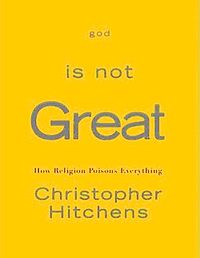I thought it might be helpful for me to post some of the things that I read that inspire this blog. I’m now considering the dissection of theism, atheism, and the intersection of belief as my hobby. Some people crochet. I read about belief systems.
Sometimes I’ll provide reviews, sometimes I’ll just note what I’m reading, and sometimes I’ll probably be compelled to make chapter notes or arguments
First on deck: god is not Great: How Religion Poisons Everything by Christopher Hitchens, (Twelve/New York, 2007).
not Great: How Religion Poisons Everything by Christopher Hitchens, (Twelve/New York, 2007).
It may appear as if I’m a dollar short and a day late in reviewing this book. But unfortunately, it continues to have unwarranted influence in the atheist/theist conversation.
My advice to Hitchens, were he to ask (which he is not going to do) is to write about a subject you know. It is pretty clear from this work that he only has a working knowledge of the religious individual, and even that knowledge seems only to be about those who might fly a banner under the term “fundamentalist.” I would liken his research to be as if I were writing a book on “chefs” and ended up only speaking about pastry chefs specializing in custard. In short: his scope is narrow and thus his arguments must paint with a wide brush if they’re going to cover over the glaring misjudgments and philosophical mistakes he makes.
Of particular note is his insistence on defining what it means to be “religious” for the religious individual. In his chapter, “Does Religion Make People Behave?” he claims that Martin Luther King, Jr. was “in no real as opposed to nominal sense…a Christian.” (176) His reasoning? That he never invoked the fires of Hell in response to those who attacked him. He goes on to paint Dietrich Bonhoeffer and Mohandas Gandhi in a similar light, claiming that they truly did not “follow” the religions they confessed because, had they, they would not have behaved as they did in life.
Hitchens cannot effectively do what he desires to: define the religious individual. For him, there is no such thing as a la carte religiosity. Unfortunately, the entire history of religious identity and religious expression does not support his assertion. To take Christianity as just one example, John Dominic Crossan and J.A.O. Preus are about as far apart on the suscriptional spectrum as you can find, and yet both identify themselves under the moniker “Christian.” Now, it could be argued that one of these two (or both?) are not in fact “Christian” according to a strict definition of the term, but unfortunately for Hitchens there is no such definition, no matter how hard (and with what hubris!) he tries to make one himself. Indeed, even the historical measure of most Christians, the Apostle’s Creed, could be professed by Crossan and Preus, without uniformity of understanding.
In short: Hitchens writes largely in fiction when he writes about the “religious individual.”
Hitchens also runs into trouble when he attempts to discuss the religious documents that he so vehemently rails against. In his chapter entitled “The Evil of the ‘New’ Testament” he notes that “Either the Gospels are in some sense literal truth, or the whole thing is essentially a fraud and perhaps an immoral one at that.” (120) This is just one instance of literally dozens where Hitchens sets his own limits on what it means to interpret Scripture. This “all or none” mentality puts him more in the camp of the religious fundamentalist than anything else. He ultimately fails to be what he wants to be, and ends up sounding like those he goes to great lengths to demonize.
When he is not beating up on his fictitious religious individual, he adds little to the arguments surrounding God’s existence. Save for one chapter on the subject (The Metaphysical Claims of Religion are False), Hitchens prefers to make mockery of other belief systems instead of arguing for why they are weak in comparison to his own. Surely there are mini-arguments throughout the work, but these are never fully fleshed out, supported more by smirks and winks than by serious scholarship or philosophical argumentation. This is not surprising, of course. The man would like to sell books. And that, I believe, is his main motivation: success. For as much as he rails against the tithe and offerings of the religious institution, every sale of his work sends funds straight to himself.
At the heart of Hitchens beef is fear. He betrays this fact early on in his chapter “Religion Kills.” In recounting a visit by Salman Rushdie, Hitchens recalls with anger how his friend was demonized and threatened with bodily harm by the Ayatollah Khomeini for the Satanic Verses, a masterful work that is not regarded highly by fundamentalist Islam. For housing Rushdie, Hitchens also became a target for fundamentalist anger. He writes,
“It is not possible for me to say, Well, you pursue your Shiite dream of a hidden imam and I pursue my study of Thomas Paine and George Orwell, and the world is big enough for both of us. The true believer cannot rest until the whole world bows the knee. Is it not obvious to all, say the pious, that religious authority is paramount, and that those who decline to recognize it have forfeited their right to exist?” (31)
This quote tells a strong tale. Fear will lead the rational to adopt irrationality to survive. How Hitchens misses this fact in his own motivation escapes me. Perhaps he has once or twice said, “I am overstating my case…” But if he has, it is not apparent in his writing. Instead, his pillars have been erected on his fear, and here he stands. It seems he can do no other.
Finally, Hitchens calls, at the end of this work, for a “New Enlightenment.” This, I think, provides a lens that one could view the entire work through. Hitchens is one of the remnants of Enlightenment thinking…that I would hope most have long given up. Society has regained a sense of story in truth-telling, we have regained a sense of mystery, and we have regained the sense that all is not how it should be, and probably will never be, even in the scientific community that Hitchens claims to speak on behalf of (or at least stand in solidarity with. How sad that he does not even recognize the diversity within that community!). Hitchens leans on the belief that, perhaps through reason (as defined by him and him alone), humanity might perfect itself. Unfortunately for him, people keep getting in the way…which might warn any individual paying attention that the hypothesis is wrong. Hitchens isn’t paying attention. It’s obvious in his writing, in his research, and obvious in his conclusions.

I read this post when you originally posted it and found it helpful. It is even more helpful now that I’m reading this book for a young adult book group. You’re dead on in your assessment, friend. Thanks.
I have long said that folks like Hitchens are the most ardent converts to Christian fundamentalism of all. They’ve taken it in hook line and sinker. BUT it’s up to us to do our part in dispelling such myths. We’ve been complicit through silence. No more. Thanks for publishing. J.